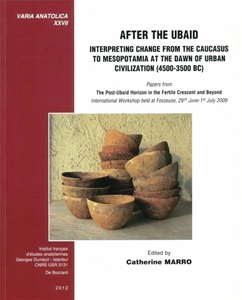Anasayfa > Kitap< Geri dönün
Rethinking World-Systems: Diasporas, Colonies, and Interaction in Uruk Mesopotamia
Yayınevi: The University of Arizona Press
ISBN: 9780816520091
1.750,00 TL (KDV Dahil)
Kargoya verilme süresi: 1 - 5 İş Günü
Yazar: Gil J Stein
Cilt tipi: Şömizli Sert Kapak
The use of world-systems theory to explain the spread of social complexity has become accepted practice by both historians and archaeologists. Gil Stein now offers the first rigorous test of world systems as a model in archaeology, arguing that the application of world-systems theory to noncapitalist, pre-fifteenth-century societies distorts our understanding of developmental change by overemphasizing the role of external over internal dynamics. In this new study, Stein proposes two complementary theoretical frameworks for the study of interregional interaction: a "distance-parity" model, which views world-systems as simply one factor in a broader range of intersocietal relations, and a "trade-diaspora" model, which explains variation in exchange systems from the perspective of participant groups. He tests his models against the archaeological record of Mesopotamian expansion into the Anatolian highlands during the fourth millennium B.C. Whereas some scholars have considered this "Uruk expansion" to be one of the earliest documented world-systems, Stein uses data from the site of Hacinebi in southeastern Turkey to support his alternate perspective. Comparing economic data from pre- and postcontact phases, Stein shows that the Mesopotamians did not dominate the people of this distant periphery. Such evidence, argues Stein, shows that we must look more closely at the local cultures of peripheries to develop realistic cross-cultural models of variation in colonialism, exchange, and secondary state formation in ancient societies.
English
1999
206 Pages
15 x 23 cm

 Mesopotamia and the Bible
Mesopotamia and the Bible Mesopotamia
Mesopotamia Uruk Yayılım Kuramları Tarihteki En Eski Koloniciler Barışçılar mı Savaşçılar mı ? Kuramsal Bir Değerlendirme
Uruk Yayılım Kuramları Tarihteki En Eski Koloniciler Barışçılar mı Savaşçılar mı ? Kuramsal Bir Değerlendirme Uruk: 5000 Jahre Megacity
Uruk: 5000 Jahre Megacity After the Ubaid. Interpreting Change from the Caucasus to Mesopotamia at the Dawn of Civilization (4500-3500 BC)
After the Ubaid. Interpreting Change from the Caucasus to Mesopotamia at the Dawn of Civilization (4500-3500 BC) The Legacy of Mesopotamia
The Legacy of Mesopotamia